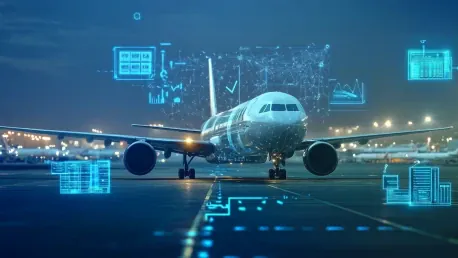The global air cargo industry is experiencing a transformative evolution driven by the advent of advanced technologies such as Artificial Intelligence (AI), Blockchain, and the Internet of Things (IoT). As these technologies continue to mature, they bring about substantial benefits, particularly in enhancing air cargo compliance processes. With rising regulatory demands and the increasing complexity of global trade, traditional compliance systems struggle to keep pace. This is where Regulatory Technology, or RegTech, steps in, providing innovative solutions to streamline, automate, and optimize compliance processes across the entire air cargo industry.
The Role of RegTech in Modernizing Compliance
RegTech has the potential to revolutionize air cargo compliance by enabling operations at a scale that was previously unattainable. It minimizes delays, reduces operational costs, and boosts transparency and data integrity across international supply chains. Key stakeholders, including airlines, freight forwarders, and ground handlers, stand to gain significantly from the adoption of RegTech. Emerging technologies within this field are converging to redefine compliance, offering real-time insights and automating numerous traditionally manual tasks. This digital transformation is essential for the industry to adapt efficiently to ever-changing regulatory landscapes.
As regulations become more stringent and comprehensive, RegTech solutions provide the necessary tools to comply with these requirements without compromising efficiency. The adoption of RegTech enables stakeholders to streamline their processes, maintain accurate records, and ensure data integrity across borders. This integration is particularly beneficial in enhancing overall transparency, thereby fostering trust between industry players and regulatory bodies. Thus, RegTech serves as a critical component in modernizing air cargo compliance, ensuring the industry remains agile and compliant in a fast-paced environment.
Challenges of Traditional Compliance Systems
Historically, air cargo compliance has relied on siloed systems and paper-based processes. While these methods have been functional, they are plagued by inefficiencies, errors, and limited scalability. In an industry where time is a critical factor, any delay or non-compliance can disrupt entire supply chains, erode profit margins, and damage customer satisfaction. The increasing complexity of regulations, driven by geopolitical shifts and global priorities such as sustainability, puts even more pressure on these traditional compliance methods.
The need for a digital transformation in compliance systems has reached a tipping point, making the role of RegTech indispensable. Traditional methods are often labor-intensive and prone to human error, resulting in costly delays and penalties. As regulatory landscapes evolve, the ability to quickly adapt and maintain compliance becomes more challenging without the assistance of advanced technology. RegTech addresses these challenges by offering automated solutions that not only enhance accuracy but also improve efficiency, allowing stakeholders to focus on strategic initiatives rather than tedious compliance tasks.
The Evolution of Compliance with RegTech
RegTech is revolutionizing air cargo compliance by streamlining critical procedures, such as customs documentation, security protocols, and denied-party screenings. Leading airlines, including Lufthansa Cargo and Emirates SkyCargo, have already embraced RegTech solutions, experiencing benefits such as faster processing times, reduced errors, and lower operational costs. These advancements are not limited to airlines; freight forwarders are also adopting RegTech to navigate the complexities of trade regulations more effectively. Early assessment of compliance risks enables them to offer better guidance to exporters and importers, ultimately enhancing efficiency and providing a competitive edge.
The digitization of compliance processes allows stakeholders to proactively manage regulatory requirements, reducing the likelihood of non-compliance and associated penalties. Moreover, the ability to generate and store electronic documents eliminates the need for cumbersome paper trails, further streamlining operations. As the air cargo industry continues to embrace digital transformation, the integration of RegTech promises to deliver significant improvements in compliance efficiency and effectiveness. By leveraging advanced technologies, businesses can stay ahead of regulatory changes and maintain a high standard of compliance.
Key Compliance Workflows Enhanced by RegTech
There are several critical areas within air cargo compliance that benefit significantly from RegTech solutions. One of the most notable areas is the automation of export controls and the classification of goods. AI-driven tools can automate the classification of goods under specific export control lists, ensuring accurate and timely compliance. Additionally, technology frameworks streamline the process of customs declarations and messaging, reducing the paperwork burden and accelerating clearance times.
Programs like the European Union’s ACC3 and the Transportation Security Administration’s Known Shipper Program in the United States require meticulous documentation, where advanced technologies enhance compliance management. Real-time screenings against dynamic sanction lists are crucial in identifying high-risk shipments, allowing compliance officers to prioritize reviews effectively. The digital validation of critical documents, such as certificates of origin and insurance policies, also plays a vital role in mitigating fraud risk and enabling seamless, paperless operations.
The integration of RegTech with other innovative technologies further enhances compliance workflows. For instance, Blockchain ensures real-time cargo status validation and compliance tracking, providing a transparent and immutable record of each shipment. IoT devices embedded in cargo shipments offer real-time monitoring of parameters such as temperature, location, humidity, and shock data, enabling proactive compliance management. AI-powered predictive compliance tools analyze historical and live data to anticipate potential regulatory issues and mitigate risks, making the entire compliance process more efficient and reliable.
Integration with Emerging Technologies
The integration of RegTech with emerging technologies like Blockchain, IoT, and predictive analytics is transforming how air cargo compliance is managed. The International Air Transport Association’s (IATA) ONE Record standard is a prime example, promoting interoperability between airline systems, ground handlers, and freight forwarders. This standardization reduces processing times and minimizes document mismatches, thereby enhancing overall operational efficiency.
Blockchain technology plays a crucial role in ensuring real-time validation of cargo status and compliance tracking, providing an immutable ledger that enhances transparency and accountability. Although large-scale adoption of Blockchain is still in progress, its potential to revolutionize air cargo compliance is undeniable. IoT, with its ability to provide real-time monitoring, helps maintain the integrity of shipments by tracking parameters such as temperature, location, and humidity. This real-time data allows for proactive compliance measures, ensuring that shipments meet regulatory requirements throughout the supply chain.
Predictive compliance, powered by AI, takes things a step further by analyzing both historical and real-time data to forecast potential regulatory issues. This foresight enables stakeholders to address and mitigate risks before they become problematic, ensuring smoother and more compliant operations. The combination of these emerging technologies with RegTech creates a robust compliance framework that enhances efficiency, accuracy, and reliability across the air cargo industry.
Future-Ready Compliance by 2030
Looking ahead to 2030, air cargo compliance is expected to evolve beyond supporting automation to fully embracing it as a core function. The integration of real-time compliance monitoring and AI-driven solutions will redefine how compliance is managed, making it an integral part of every transaction. This evolution promises a more efficient, compliant, and customer-focused industry, where regulatory adherence is seamlessly embedded into daily operations.
The shift towards automation and intelligence in compliance processes will lead to significant advancements in how the air cargo industry operates. Real-time monitoring tools will provide instant insights into compliance status, allowing for proactive decision-making and rapid response to any potential issues. AI-driven solutions will offer predictive capabilities, enabling stakeholders to anticipate regulatory changes and adjust their operations accordingly. This level of intelligence and automation will not only enhance compliance but also improve overall operational efficiency, making the air cargo industry more resilient and adaptable to future challenges.
Strategic Roadmap for Air Cargo Stakeholders
To fully leverage the benefits of RegTech, air cargo stakeholders need to adopt a proactive strategy. Establishing a digital compliance framework is a crucial first step, as it provides a structured approach to evaluating and integrating new technologies. Reskilling teams to harness the potential of RegTech effectively is equally important, ensuring that personnel are equipped with the necessary skills to manage and operate advanced compliance systems.
Identifying high-impact automation opportunities early on can deliver significant benefits, allowing stakeholders to focus their efforts on areas where automation can have the most substantial impact. Collaborating across departments is also essential for driving meaningful change, fostering a culture of innovation and continuous improvement. By embracing RegTech and adopting a strategic roadmap, the air cargo industry can position itself for future success, ensuring superior customer service and more resilient supply chains.
Embracing a New Era of Compliance
The global air cargo industry is undergoing a significant transformation driven by advanced technologies like Artificial Intelligence (AI), Blockchain, and the Internet of Things (IoT). As these technologies evolve, they offer considerable advantages, especially in improving air cargo compliance processes. Increasing regulatory demands and the intricate nature of global trade make traditional compliance systems inadequate to meet current needs. This situation has given rise to Regulatory Technology, or RegTech, which delivers innovative solutions to streamline, automate, and enhance compliance processes throughout the air cargo sector. As a result, RegTech is revolutionizing the industry by handling complex regulatory requirements more efficiently, reducing errors, and accelerating operations. This technological shift not only ensures better adherence to regulations but also fosters greater operational efficiency, security, and transparency within the industry.









